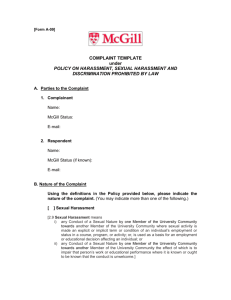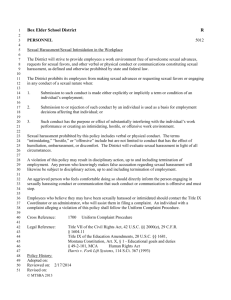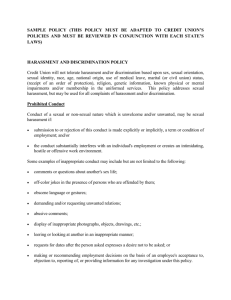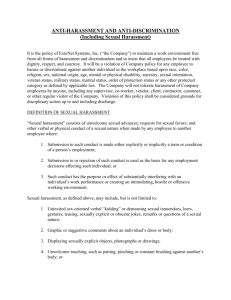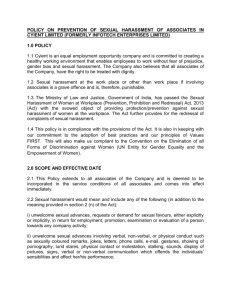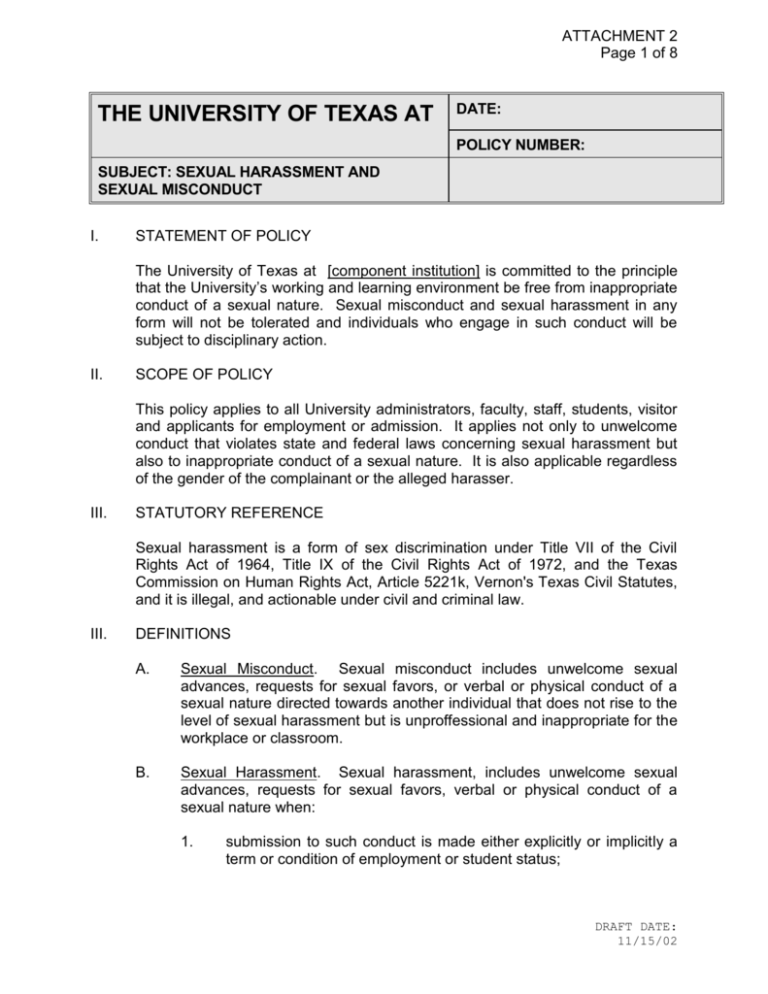
ATTACHMENT 2
Page 1 of 8
THE UNIVERSITY OF TEXAS AT
DATE:
POLICY NUMBER:
SUBJECT: SEXUAL HARASSMENT AND
SEXUAL MISCONDUCT
I.
STATEMENT OF POLICY
The University of Texas at [component institution] is committed to the principle
that the University’s working and learning environment be free from inappropriate
conduct of a sexual nature. Sexual misconduct and sexual harassment in any
form will not be tolerated and individuals who engage in such conduct will be
subject to disciplinary action.
II.
SCOPE OF POLICY
This policy applies to all University administrators, faculty, staff, students, visitor
and applicants for employment or admission. It applies not only to unwelcome
conduct that violates state and federal laws concerning sexual harassment but
also to inappropriate conduct of a sexual nature. It is also applicable regardless
of the gender of the complainant or the alleged harasser.
III.
STATUTORY REFERENCE
Sexual harassment is a form of sex discrimination under Title VII of the Civil
Rights Act of 1964, Title IX of the Civil Rights Act of 1972, and the Texas
Commission on Human Rights Act, Article 5221k, Vernon's Texas Civil Statutes,
and it is illegal, and actionable under civil and criminal law.
III.
DEFINITIONS
A.
Sexual Misconduct. Sexual misconduct includes unwelcome sexual
advances, requests for sexual favors, or verbal or physical conduct of a
sexual nature directed towards another individual that does not rise to the
level of sexual harassment but is unproffessional and inappropriate for the
workplace or classroom.
B.
Sexual Harassment. Sexual harassment, includes unwelcome sexual
advances, requests for sexual favors, verbal or physical conduct of a
sexual nature when:
1.
submission to such conduct is made either explicitly or implicitly a
term or condition of employment or student status;
DRAFT DATE:
11/15/02
ATTACHMENT 2
Page 2 of 8
C.
IV.
2.
submission to or rejection of such conduct is used as a basis for
evaluation in making personnel or academic decisions affecting that
individual; or
3.
such conduct has the purpose or effect of unreasonably interfering
with an individual's performance as an administrator, faculty
member, staff or student, or creating an intimidating, hostile or
offensive environment.
Examples. Examples of behavior that could be considered sexual
misconduct or sexual harassment include but are not limited to:
1.
physical contact of a sexual nature including touching, patting,
hugging, or brushing against a person's body;
2.
explicit or implicit propositions or offers to engage in sexual activity;
3.
comments of a sexual nature including sexually explicit statements,
questions, jokes or anecdotes; remarks of a sexual nature about a
person's clothing or body; remarks about sexual activity;
speculation about sexual experience;
4.
exposure to sexually oriented graffiti, pictures, posters, or materials;
and/or
5.
physical interference
movements.
with
or
restriction
of
an
individual's
CONSENSUAL RELATIONSHIPS
(Prohibited)
It is the policy of the University of Texas [component institution] that the following
romantic or sexual relationships are prohibited:
between a faculty member and a student who is enrolled in the faculty
member’s course or who is otherwise under the supervision of the faculty
member, or
between a supervisor and a person under his or her supervision.
This policy is not intended to discourage the interaction of faculty and students,
and supervisors and employees where it is appropriate and ethical; however, it is
intended to clarify that romantic or sexual relationships often create situations
that lead to sexual harassment, conflicts of interest, favoritism, and low morale.
Therefore, such relationships are prohibited and subject to disciplinary action.
[OR]
(Discouraged)
DRAFT DATE:
11/15/02
ATTACHMENT 2
Page 3 of 8
Every consenting romantic and sexual relationships between a faculty member
and a student or between supervisor and employee may potentially evolve into a
sexual harassment case with serious implications, either from a subsequent
change of attitude by the parties involved or from a contemporary complaint from
a disadvantaged third party. Faculty members exercise power over students, as
do supervisors over employees, whether in evaluating them, making
recommendations for their promotion or future employment, or conferring other
benefits. Others may be adversely affected by the relationship in that it places
the faculty member or supervisor in a position to favor or advance one student or
employee’s interest at the expense of others.
As provided in the American Association of University Professors policy on
consensual relationships, faculty are expected to be aware of their professional
responsibilities in their relationships with students and “avoid apparent or actual
conflict of interest, favoritism, or bias.” These relationships are viewed as
damaging to the University environment and therefore are strongly discouraged.
Complaints concerning consensual relationships by non participating individuals
will be treated as third-party sexual harassment or sexual misconduct complaints.
V.
INFORMAL RESOLUTION
This process may be used as a prelude to filing a formal complaint or as an
alternative. It is not necessary that this option be used. Anyone who believes
that he or she has been subject to sexual harassment or sexual misconduct may
immediately file a formal complaint as described in Section VI of this policy. An
individual wishing to utilize the informal resolution process should contact the
Employee Relations Official, EEO Compliance Officer or the Dean of Students,
as designated by the University.
A.
Informal Assistance. The individual is provided assistance in attempting to
resolve possible sexual harassment or sexual misconduct if the individual
does not wish to file a formal complaint. Such assistance includes
strategies for the individual to effectively inform the offending party that his
or her behavior is unwelcomed and should cease, action by an
appropriate university official to stop the unwelcomed conduct, or
mediation. However, the University may take more formal action to
ensure an environment free of sexual harassment or sexual misconduct.
B.
Timeframe. Informal resolutions will be completed within 30 days from
receipt of a request for informal resolution.
C.
Confidentiality and Documentation. The University will document informal
resolutions. The Office of the Dean of Students or the Office of Equal
Employment Opportunity as appropriate will retain such documentation.
The University will endeavor to maintain confidentiality to the extent
permitted by law. Where the individual’s desire to maintain anonymity
DRAFT DATE:
11/15/02
ATTACHMENT 2
Page 4 of 8
constrain attempts at establishing facts and eliminating the potential
harassment, the University will attempt to find the right balance between
the individual’s desire for privacy and confidentiality with the responsibility
of the University to provide an environment free of sexual harassment.
VI.
COMPLAINT PROCEDURES (This complaint procedure also constitutes the
grievance procedure for complaints alleging unlawful sex discrimination required
under Title IX of the Education Amendments of 1972. As used herein,
“complaint” is synonymous with “grievance.”)
A.
Reporting
1. The University of Texas at [component institution] encourages any
person who believes that he or she has been subjected to sexual
misconduct or sexual harassment to immediately report the incident to
the appropriate supervisor of the accused faculty member or
employee, to the EEO Compliance Officer or Employee Relations
Officer, or when a student is the complainant or the accused individual,
to the Dean of Students. In no case will a complainant be required to
report such conduct to the person accused of the misconduct. The
complainant will be advised of the procedures for filing a formal
complaint of sexual harassment or sexual misconduct. When a
supervisor or the Dean of Students receives a complaint, he or she will
immediately notify the EEO Compliance Officer or Employee Relations
Officer, as designated by the University.
2. Complaints should be filed as soon as possible after the conduct giving
rise to the complaint, but no later than ____ days after the event
occurred.
3. In order to initiate the investigation process, the complainant should
submit a signed, written statement setting out the details of the conduct
that is the subject of the complaint, including the complainant’s name,
signature, and contact information; the name of the person directly
responsible for the alleged violation; a detailed description of the
conduct or event that is the basis of the alleged violation; the date(s)
and location(s) of the occurrence(s); the names of any witnesses to the
occurrence(s); the resolution sought; and any documents or
information that is relevant to the complaint. While an investigation
may begin on the basis of an oral complaint, the complainant is
strongly encouraged to file a written complaint. When a supervisor or
the Dean of Students receives a complaint with a written statement,
he/she shall immediately notify the EEO Compliance Officer or
Employee Relations Officer, as designated by the University.
B.
Complaint Investigation
DRAFT DATE:
11/15/02
ATTACHMENT 2
Page 5 of 8
1. The Dean of Students, Employee Relations Officer and/or the EEO
Compliance Officer, as appropriate, is responsible for investigating
formal complaints. If the complaint is not in writing, the investigator
should prepare a statement of what he or she understands the
complaint to be and seek to obtain verification of the complaint from
the complainant.
2. Within five working days of receipt of a complaint, the Dean of
Students, Employee Relations Officer and/or the EEO Compliance
Officer, as appropriate, may either dismiss the complaint or authorize
an investigation of the complaint. A complaint may be dismissed if the
facts alleged in the complaint, even if taken as true, does not constitute
sexual misconduct or sexual harassment; the complaint fails to allege
any facts that suggests sexual misconduct or sexual harassment
occurred; or the appropriate resolution or remedy has already been
achieved, or has been offered and rejected.
2.1 If it is determined that a complaint will not be
investigated, the Dean of Students, Employee Relations
Officer and/or the EEO Compliance Officer, as appropriate,
will send the complainant a notification letter explaining the
reason and informing the complainant that, within ten (10)
working days of the notification, he or she may appeal the
decision not to proceed with a complaint investigation to the
Vice President for Business Affairs or the Vice President for
Student Affairs, as appropriate. The written appeal must
explain why the decision to dismiss the complaint was in
error. The appropriate vice president will respond within
twenty (20) working days of receipt of the appeal. The vice
president’s decision is final. If the decision to dismiss is
overturned, the complaint is sent back to Equal Opportunity
Services or the Office of the Dean of Students, as
appropriate, for investigation in accordance with the
procedures outlined below.
3. As part of the investigation process, the accused individual shall be
provided with a copy of the complaint and allowed a reasonable time to
respond in writing.
4. The complainant and the accused individual may present any
document or information that is believed to be relevant to the
complaint.
5. Any persons thought to have information relevant to the complaint will
be interviewed and such interviews will be appropriately documented.
Other acceptable methods for gathering information include but are not
DRAFT DATE:
11/15/02
ATTACHMENT 2
Page 6 of 8
limited to visual inspection of materials alleged to be offensive and
follow-up interviews as necessary.
6. The investigation of a complaint will be concluded as soon as possible
after receipt of the written complaint. In investigations exceeding 60
days, a justification for the delay will be presented to and reviewed by
the vice president overseeing the investigative office.
The
complainant, accused individual and supervisor will be provided an
update on the progress of the investigation after the review.
7. Upon completion of the investigation, a written report will be issued.
The report shall include: a recommendation of whether a violation of
the policy occurred, an analysis of the facts discovered during the
investigation, and recommended disciplinary action if a violation of the
policy occurred.
8. A copy of the report will be sent to the appropriate administrative
official, the appropriate vice president, the complainant and the
respondent. The complainant and respondent have seven (7) working
days from the date of the report to submit comments regarding the
report to the administrative official. However, if a complaint is filed
against a student, then the complainant and respondent may not
receive or comment on the report in accordance with the Family
Education Rights and Privacy Act’s restrictions on disclosure of
educational records.
9.
Within ___ working days of receiving any comments submitted by the
complainant or respondent, the appropriate administrative official will
take one of the following actions: a) request further investigation into
the complaint; b) dismiss the complaint if the results of the completed
investigation are inconclusive or there is insufficient reasonable,
credible evidence to support the allegation(s); or c) find that this policy
was violated. A decision that this policy was violated shall be made
upon the record provided by the investigator and any comments
submitted by the complainant or respondent; and shall be based on the
totality of circumstances surrounding the conduct complained of,
including but not limited to: the context of that conduct, its severity,
frequency, whether it was physically threatening, humiliating, or was
simply offensive in nature. Facts will be considered on the basis of
what is reasonable to persons of ordinary sensitivity and not on the
particular sensitivity or reaction of an individual.
10. If the appropriate administrative official determines that this policy was
violated, he or she, will take disciplinary action that is appropriate for
the severity of the conduct. Disciplinary actions can include, but are not
limited to, written reprimands, the imposition of conditions,
reassignment, suspension, and dismissal.
DRAFT DATE:
11/15/02
ATTACHMENT 2
Page 7 of 8
11. The complainant and the respondent shall be informed in writing of the
administrative official’s decision and be provided a copy of the final
statement of findings. However, if a complaint is filed against a
student, then the complainant may not receive this information as the
Family Education Rights and Privacy Act prohibits such disclosures.
12. Implementation of disciplinary action against faculty and employees
will be handled in accordance with the University’s policy and
procedures for discipline and dismissal of faculty and employees. The
Dean of Students will impose disciplinary action, if any, against a
student in accordance with the University’s student disciplinary
procedures.
VII.
VIII.
PROVISIONS APPLICABLE TO ALL COMPLAINTS
A.
Assistance. During the complaint process, a complainant or respondent
may be assisted by a person of his or her choice; however, the assistant
may not examine witnesses or otherwise actively participate in a meeting
or interview.
B.
Retaliation. An administrator, faculty member, student or employee who
retaliates in any way against an individual who has brought a complaint
pursuant to this policy or an individual who has participated in an
investigation of such a complaint is subject to disciplinary action, including
dismissal.
C.
False Complaints. Any person who knowingly and intentionally files a
false complaint under this policy is subject to disciplinary action up to and
including dismissal from the university.
D.
Confidentiality and Documentation.
The University shall document
complaints and their resolution. The Office of the Dean of Students or the
Office of Equal Employment Opportunity as appropriate shall retain such
documentation.
To the extent permitted by law, complaints and
information received during the investigation will remain confidential.
Relevant information will be provided only to those persons who need to
know in order to achieve a timely resolution of the complaint.
DISSEMINATION OF POLICY
A.
The policy will be made available to all faculty, employees and students.
Periodic notices sent to students, employees and faculty about the
University’s Sexual Harassment and Sexual Misconduct Policy will include
information about the complaint procedure and will refer individuals to
designated offices or officials for additional information.
DRAFT DATE:
11/15/02
ATTACHMENT 2
Page 8 of 8
B.
The University will periodically educate and train employees and
supervisors regarding the policy and conduct that could constitute a
violation of the policy.
DRAFT DATE:
11/15/02


